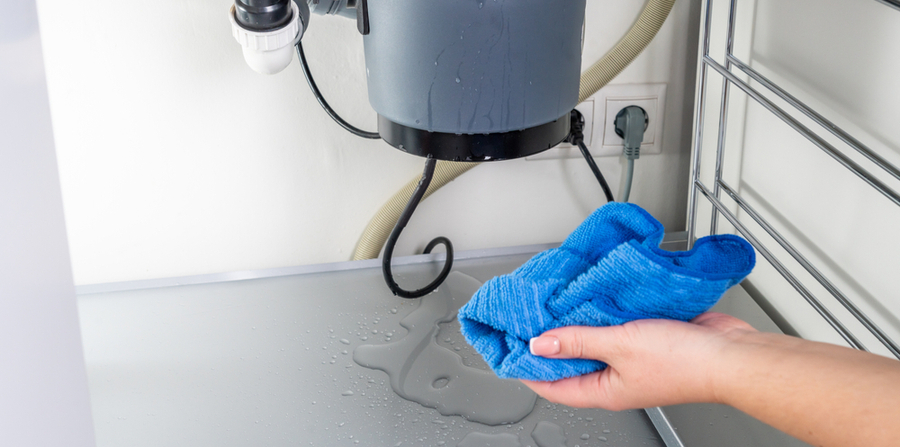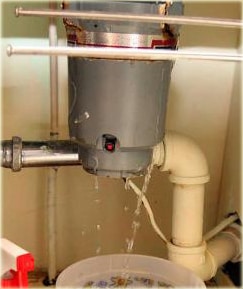Handy Techniques for Repairing a Dripping Garbage Disposal
Handy Techniques for Repairing a Dripping Garbage Disposal
Blog Article
The content which follows on the subject of The Handy Guide To Fixing Your Garbage Disposal Leaking is quite enlightening. Read on and draw your own findings.

Garbage disposals are crucial kitchen area devices that aid in throwing away food waste successfully. However, a leaking waste disposal unit can be an aggravating and untidy issue to take care of. Luckily, numerous leaks can be dealt with conveniently with a few easy steps. In this article, we will certainly talk about exactly how to deal with a dripping garbage disposal successfully.
Intro
Waste disposal unit are set up under kitchen area sinks and are created to shred food waste into smaller items, permitting it to go through the plumbing system easily. While these tools are normally trusted, leakages can happen over time as a result of deterioration, loose links, or damage to the device.
Step-by-Step Guide to Fixing a Dripping Waste Disposal Unit
Shut off the Power
Prior to trying any type of repairs, make certain that the power to the waste disposal unit unit is turned off to avoid the risk of electrical shock.
Find the Leak
Recognize the exact area of the leakage and figure out the cause
Tighten up Links
Use a wrench to tighten any kind of loosened links between the disposal device and the pipes system.
Replace Seals or Gaskets
If the leak is because of used seals or gaskets, remove the old components and change them with new ones.
Patching Cracks or Holes
For cracks or holes in the disposal device, use epoxy or an ideal patching material to seal the broken area.
Determining the Resource of the Leakage
Prior to trying to fix a dripping waste disposal unit, it is essential to recognize the resource of the leakage. This can usually be done through aesthetic evaluation or by carrying out easy examinations.
Visual Assessment
Inspect the garbage disposal system carefully for any type of indicators of water leak. Pay close attention to locations around seals, gaskets, and connection factors.
Checking for Leaks
One means to evaluate for leakages is by running water with the disposal unit and checking for any noticeable indications of leakage.
Usual Reasons For Leaks in Trash Disposals
Worn Seals and Gaskets
Seals and gaskets play a critical function in protecting against water from leaking out of the waste disposal unit. Over time, these elements can deteriorate, causing leaks around the disposal unit.
Loose Connections
The links in between the waste disposal unit and the pipes system can come to be loosened over time, creating water to leakage out throughout procedure.
Splits or Openings in the Disposal System
Physical damages to the waste disposal unit, such as splits or holes in the real estate, can likewise result in leakages.
Devices and Products Needed for Fixing a Leaking Garbage Disposal
Before beginning the repair service procedure, gather the required tools and materials, including a screwdriver, flexible wrench, plumbing professional's putty, replacement seals or gaskets, and epoxy or patching material for fixing splits or openings.
Examining the Garbage Disposal After Repair
Once the repair is full, examine the waste disposal unit by running water via it to make sure that the leakage has actually been dealt with.
Preventive Upkeep Tips to Stay Clear Of Future Leaks
To prevent future leaks, it is vital to perform routine maintenance on your garbage disposal. This includes keeping it clean, avoiding putting non-food products or difficult items down the disposal, and periodically checking for leaks or other issues.
Conclusion
In conclusion, repairing a leaking garbage disposal is a reasonably straightforward procedure that can be finished with fundamental devices and products. By complying with the actions detailed in this article and exercising preventive upkeep, you can keep your garbage disposal in good working condition and stay clear of pricey repairs in the future.
HERE’S HOW TO FIX YOUR GARBAGE DISPOSAL
WHAT TO DO IF SOMETHING IS STUCK IN YOUR GARBAGE DISPOSAL
If the impeller won’t turn, there’s probably something stuck in the disposal. It could be a steak bone or peach pit, although plumbers report pulling all sorts of inappropriate objects out of disposals, such as bottle caps or aluminum foil. Make sure power to the disposal is off, and look inside to see if you can see the source of the jam.
Never stick your fingers in a disposal. Pull out anything you see with tongs or pliers.
If the disposal still won’t work, it may be time to call a plumber or consider buying a new disposal. GEM Plumbing & Heating is here for all of your garbage disposal needs.
WHAT TO DO IF YOUR GARBAGE DISPOSAL DRAIN IS CLOGGED
Take everything out from underneath your sink and put a bucket or other container under your disposal to catch any water that drains out. Disconnect your disposal from the power supply. If it’s plugged into a wall outlet, unplug it. If it’s hardwired into an electrical box, go to the electrical panel and turn off the breaker for the disposal. Pour ¼ cup of baking soda into the drain, followed by ½ cup of white vinegar. Give the solution a few minutes to fizz and do its work. Look into the disposal with a flashlight to see if you can see an object that might be causing the clog. If you see it, remove it using tongs or pliers. MORE TIPS ON DEALING WITH A CLOGGED GARBAGE DISPOSAL
Never use drain cleaner in a garbage disposal. It can damage the plastic parts inside the disposal. You can also be splashed with the caustic liquid while working to clear the clog. Beware! Never stick your fingers into a garbage disposal. Trust us — not a good idea. In many instances, your dishwasher drains through your garbage disposal. This allows the disposal to grind any large food particles that may be drained out of your dishwasher. There are some jurisdictions, however, where the plumbing code prohibits such a connection. WHAT TO DO WHEN YOUR DISHWASHER DRAINS THROUGH THE DISPOSAL
Run some water in the sink so your plunger has at least a ½-inch of water to create a seal and plunge vigorously up and down several times. You may need to repeat this several times. Run hot water down the drain to clear any residue that remains.

We were shown that write-up about Why Is through an associate on another web address. Sharing is nice. Helping people is fun. Thank you for your time spent reading it.
Go Deal Now Report this page